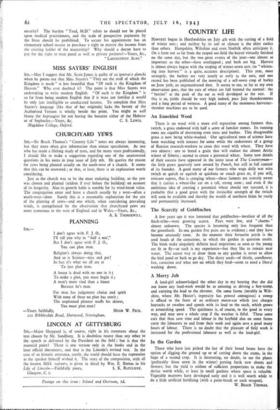COUNTRY LIFE - HARVEST began in Hertfordshire on July 4th
with the cutting of a field of winter oats ; and neither by its soil or climate is the shire earlier than others. Hampshire, Wiltshire and even Norfolk often anticipate it. On a farm not so far from the reaped oat-field the haysel virtually finished on the same day, but the two great events of the year—one almost as important as the other—have overlapped ; and both are big. Harvest is almost always begun with the reaping of winter-sown oats (so " whiten- ing into harvest " is a quite. accurate description). This year, most strangely, the barleys are very nearly as early as the oats, and one record has been published of the mowing of a self-sown crop of barley on June 3oth, an unprecedented date. It seems to me, so far as my own observation goes, that the ears of wheat are full beyond the normal: the " berries" at the peak of the ear as well developed as the rest. If this is so, yields should be very high indeed, pace July thunderstorms and a long period of wetness. A good many of the enormous harvester- thresher machines are to be used.
An Ennobled Weed
There is no weed with a more evil reputation among farmers that. twitch, a grass endowed with half a score of familiar names. Its running roots are capable of destroying even trees and bushes. This disagreeable grass is now being white-washed. - Our agricultural men of science have been watching with interest for some while the endeavours of a group of Russian research-workers to cross this weed with wheat. They have two objects: one to breed a grain that will endure the almost Arctic winter of Siberia ; second to create a perennial wheat. Some new details of their success have appeared in the latest issue of The Cousuryman- the little green quarterly now owned by Punch, but still in full control of its founder. A good many of our farmers who wage daily war witn twitch or quitch or squitch or quickens or couch grass or, if you will, triticum repens, that is creeping wheat—these farmers are scarcely aware that it carries a wheat-like ear on a tall, strong stem ; and even if the ambitious idea of creating a perennial wheat should not succeed, it is probable that a good grain with the invincible strength of the twitch will socgi be available and thereby the wealth of northern fielas be vastly and permanently increased.
The Scarcity of Goldfinches A few years ago it was lamented that goldfinches—loveliest of all the finch-tribe--were growing scarce. Pairs were few, and " charms " almost unknown. The species is becoming only less frequent than the greenfinch. In one garden five pairs are in evidence ; and they have become unusually tame. At the moment their favourite perch is the seed heads of the carnations, in which the garden in question excels. The birds make singularly definite local migrations as soon as the young are fit to fly—or such is my experience—but they like to remain near water. The surest way to draw them to any garden is never to allow the bird pond or bath to go dry. The dusty seeds—of thistle, cornflower, kex, carnation and what not on which they feed—seem to need a liberal washing down.
A Merry Job
A land-girl acknowledged the other day in my hearing that she did not know any land-work would be so amusing as driving a hay-scoop, and carrying the load to the elevator. On some farms (notably in Wilt- shire, where Mr. Hosier's ingenuity has proved contagious) a sweep is affixed to the front of an ordinary motor-car which just charges haycocks or swathes and speeds with its load to the stack, which grows at astonishing speed. The quickness is, of course, to the good in every way, and may save a whole crop if the weather is fitful. These same cars that thus save time and labour in the hayfield also on some farms carry the labourers to and from their work and again save a good many hours of labour. There is no doubt that. the pleasure of field work is increased for the professional labourer as well as the land-girl.
In the Garden • Those who have just picked the last of their broad beans have the option of digging the ground up or of cutting down the stems, in the hope of a second crop. It is interesting, no doubt, to see the plants (preferably those sown in the winter) putting forth new shoots and flowers; but the yield is seldom of sufficient proportions to make the device worth while, at least in small gardens where space is valuable. Vegetable marrows have developed early and it is well worth while to do a little artificial fertilising (with a paint-brush or such weapon). W. BEACH THOMAS.


























 Previous page
Previous page